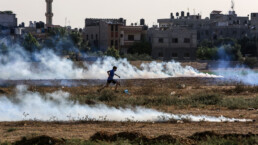The assault in July was executed using weapons from U.S. arms deals, despite tightened restrictions issued by President Joe Biden in February.
by Nour, LA Progressive
A couple of weeks ago, I visited the Jenin refugee camp in the West Bank where a major attack by the Israeli Occupation Forces , or IOF, was carried out in July under the guise of a military operation targeting militants. The two-day raid resulted in the murder of 12 Palestinians, including four children, over 100 wounded, and 3,000 forced to evacuate by the IOF’s indiscriminate violence.
Nearly a month later, there were signs of the invasion everywhere, forcing Palestinians to relive this violence daily. Streets that were destroyed by the IOF remained inaccessible, homes torched by drone strikes were haunting, bullet holes marked almost every home I passed by. The local showing me around, a resident of Jenin refugee camp, informed me that the IOF struck the streets first so that movement would be restricted. The IOF deliberately destroyed the streets of a densely populated refugee camp before attacking it from ground and air.

I witnessed two especially devastating sights that day: Shireen Abu Akleh’s memorial covered in bullet holes, a testament to the relentless violence perpetuated in Jenin, and the graves of the martyrs that this attack produced. The 12 graves were gathered on a small patch of land, with flowers planted on top of them. Some included pictures of the martyrs, revealing how young these so-called “militants” were. I could feel the collective grief for the martyrs in the air. Two young boys were visiting them when we arrived, and those passing by exclaimed, “May God have mercy on them.” The invasion failed to destroy Jenin’s spirit of resistance.
Recent Posts
‘Unconstitutional. Unethical. Authoritarian.’ ICE Bars Millions Of Immigrants From Bond Hearings
July 18, 2025
Take Action Now One watchdog said the new policy “seems like a blatant attempt to stop them from exercising their right to due process.”……
Americans Are Not Nearly Alarmed Enough About Climate Change
July 18, 2025
Take Action Now Americans still don’t comprehend how imminent, dangerous, and far-reaching the threat is—and journalists are partly to blame.By…
The IRS Is Building A Vast System To Share Millions Of Taxpayers’ Data With ICE
July 17, 2025
Take Action Now ProPublica has obtained the blueprint for the Trump administration’s unprecedented plan to turn over IRS records to Homeland Security…
Israel’s Sudden Assault On Syria Is Unchecked Aggression
July 17, 2025
Take Action Now Jerusalem is bombing Damascus and threatening al-Sharaa’s rule, while Washington was hoping to help the nascent government on…




